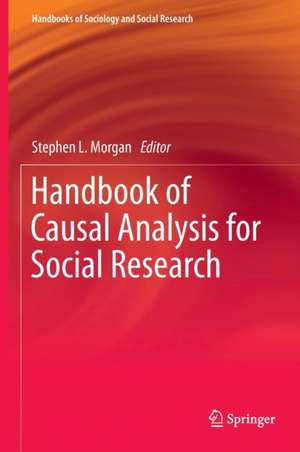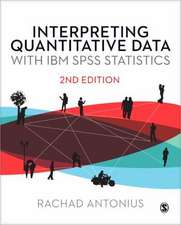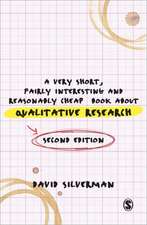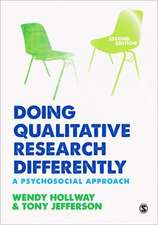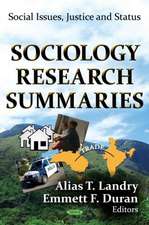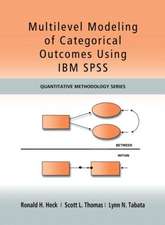Handbook of Causal Analysis for Social Research: Handbooks of Sociology and Social Research
Editat de Stephen L. Morganen Limba Engleză Hardback – 4 mai 2013
| Toate formatele și edițiile | Preț | Express |
|---|---|---|
| Paperback (1) | 596.04 lei 6-8 săpt. | |
| SPRINGER NETHERLANDS – 19 aug 2014 | 596.04 lei 6-8 săpt. | |
| Hardback (1) | 905.58 lei 3-5 săpt. | +38.75 lei 7-11 zile |
| SPRINGER NETHERLANDS – 4 mai 2013 | 905.58 lei 3-5 săpt. | +38.75 lei 7-11 zile |
Din seria Handbooks of Sociology and Social Research
- 18%
 Preț: 2112.71 lei
Preț: 2112.71 lei - 18%
 Preț: 1128.89 lei
Preț: 1128.89 lei - 23%
 Preț: 794.20 lei
Preț: 794.20 lei - 15%
 Preț: 593.26 lei
Preț: 593.26 lei - 18%
 Preț: 809.07 lei
Preț: 809.07 lei - 18%
 Preț: 1407.46 lei
Preț: 1407.46 lei - 15%
 Preț: 670.17 lei
Preț: 670.17 lei - 18%
 Preț: 1233.35 lei
Preț: 1233.35 lei - 18%
 Preț: 1411.39 lei
Preț: 1411.39 lei - 15%
 Preț: 609.79 lei
Preț: 609.79 lei - 18%
 Preț: 1026.76 lei
Preț: 1026.76 lei - 18%
 Preț: 738.20 lei
Preț: 738.20 lei - 18%
 Preț: 966.78 lei
Preț: 966.78 lei - 18%
 Preț: 971.81 lei
Preț: 971.81 lei - 20%
 Preț: 518.43 lei
Preț: 518.43 lei - 18%
 Preț: 1239.99 lei
Preț: 1239.99 lei - 18%
 Preț: 1429.07 lei
Preț: 1429.07 lei - 18%
 Preț: 1136.11 lei
Preț: 1136.11 lei - 15%
 Preț: 665.42 lei
Preț: 665.42 lei - 18%
 Preț: 1234.94 lei
Preț: 1234.94 lei - 18%
 Preț: 983.81 lei
Preț: 983.81 lei - 18%
 Preț: 954.93 lei
Preț: 954.93 lei - 18%
 Preț: 801.34 lei
Preț: 801.34 lei -
 Preț: 413.76 lei
Preț: 413.76 lei - 18%
 Preț: 755.56 lei
Preț: 755.56 lei - 18%
 Preț: 1405.09 lei
Preț: 1405.09 lei - 18%
 Preț: 1411.25 lei
Preț: 1411.25 lei - 18%
 Preț: 1406.98 lei
Preț: 1406.98 lei -
 Preț: 435.87 lei
Preț: 435.87 lei - 15%
 Preț: 654.77 lei
Preț: 654.77 lei - 15%
 Preț: 714.45 lei
Preț: 714.45 lei
Preț: 905.58 lei
Preț vechi: 995.15 lei
-9% Nou
Puncte Express: 1358
Preț estimativ în valută:
173.30€ • 188.18$ • 145.57£
173.30€ • 188.18$ • 145.57£
Carte disponibilă
Livrare economică 01-15 aprilie
Livrare express 18-22 martie pentru 48.74 lei
Preluare comenzi: 021 569.72.76
Specificații
ISBN-13: 9789400760936
ISBN-10: 9400760930
Pagini: 436
Ilustrații: XI, 424 p. 63 illus.
Dimensiuni: 178 x 254 x 29 mm
Greutate: 0.97 kg
Ediția:2013
Editura: SPRINGER NETHERLANDS
Colecția Springer
Seria Handbooks of Sociology and Social Research
Locul publicării:Dordrecht, Netherlands
ISBN-10: 9400760930
Pagini: 436
Ilustrații: XI, 424 p. 63 illus.
Dimensiuni: 178 x 254 x 29 mm
Greutate: 0.97 kg
Ediția:2013
Editura: SPRINGER NETHERLANDS
Colecția Springer
Seria Handbooks of Sociology and Social Research
Locul publicării:Dordrecht, Netherlands
Public țintă
ResearchCuprins
Preface.- Chapter 1. Introduction; Stephen L. Morgan.- Part I. Background and Approaches to Analysis.- Chapter 2. A History of Causal Analysis in the Social Sciences; Sondra N. Barringer, Erin Leahey and Scott R. Eliason.- Chapter 3. Types of Causes; Jeremy Freese and J. Alex Kevern.- Part II. Design and Modeling Choices.- Chapter 4. Research Design: Toward a Realistic Role for Causal Analysis; Herbert L. Smith.- Chapter 5. Causal Models and Counterfactuals; James Mahoney, Gary Goertz and Charles C. Ragin.- Chapter 6. Mixed Models and Counterfactuals; David J. Harding and Kristin S. Seefeldt.- Part III. Beyond Conventional Regression Models.- Chapter 7. Fixed Effects, Random Effects, and Hybrid Models for Causal Analysis; Glenn Firebaugh, Cody Warner, and Michael Massoglia.- Chapter 8. Heteroscedastic Regression Models for the Systematic Analysis of Residual Variance; Hui Zheng, Yang Yang and Kenneth C. Land.- Chapter 9. Group Differences in Generalized Linear Models; Tim F. Liao.-Chapter 10. Counterfactual Causal Analysis and Non-Linear Probability Models; Richard Breen and Kristian Bernt Karlson.- Chapter 11. Causal Effect Heterogeneity; Jennie E. Brand and Juli Simon Thomas.- Chapter12. New Perspectives on Causal Mediation Analysis; Xiaolu Wang and Michael E. Sobel.- Part IV. Systems and Causal Relationships.- Chapter 13. Graphical Causal Models; Felix Elwert.- Chapter 14. The Causal Implications of Mechanistic Thinking: Identification Using Directed Acyclic Graphs (DAGs); Carly R. Knight and Christopher Winship.- Chapter 15. Eight Myths about Causality and Structural Equation Models; Kenneth A. Bollen and Judea Pearl.- Part V. Influence and Interference.- Chapter 16. Heterogeneous Agents, Social Interactions, and Causal Inference; Guanglei Hong and Stephen W. Raudenbush.- Chapter 17. Social Networks and Causal Inference; Tyler J. VanderWeele and Weihua An.- Part VI. Retreat From Effect Identification.- Chapter 18. Partial Identification and Sensitivity Analysis; Markus Gangl.- Chapter 19. What You can Learn from Wrong Causal Models; Richard Berk, Lawrence Brown, Edward George, Emil Pitkin, Mikhail Traskin, Kai Zhang and Linda Zhao.
Recenzii
“The book consists of six parts with 19 chapters presenting articles by leading experts on development of causal modeling in sociological methodologies. … The monograph presents a collection of modern methods and methodologies, which could be useful for researchers on causal analysis in social and related fields.” (Stan Lipovetsky and Igor Mandel, Technometrics, Vol. 57 (2), May, 2015)
“The handbook covers a wide range of important topics of causal inference and surely is an invaluable resource for students and researchers interested in the topic. … due to the exceptionally high quality, the clarity of presentation, and the many examples the handbook is well-suited for teaching methodology to advanced classes. … it will bring the field of causal inference forward and raise the methodological rigor of social science research in general.” (Tobias Wolbring, Mda Methods, data, analyses, Vol. 9 (1), 2015)
“The handbook covers a wide range of important topics of causal inference and surely is an invaluable resource for students and researchers interested in the topic. … due to the exceptionally high quality, the clarity of presentation, and the many examples the handbook is well-suited for teaching methodology to advanced classes. … it will bring the field of causal inference forward and raise the methodological rigor of social science research in general.” (Tobias Wolbring, Mda Methods, data, analyses, Vol. 9 (1), 2015)
Notă biografică
Stephen L. Morgan is the Jan Rock Zubrow '77 Professor in the Social Sciences at Cornell University, Ithaca, NY, USA.
Textul de pe ultima copertă
What constitutes a causal explanation, and must an explanation be causal? What warrants a causal inference, as opposed to a descriptive regularity? What techniques are available to detect when causal effects are present, and when can these techniques be used to identify the relative importance of these effects? What complications do the interactions of individuals create for these techniques? When can mixed methods of analysis be used to deepen causal accounts? Must causal claims include generative mechanisms, and how effective are empirical methods designed to discover them? The Handbook of Causal Analysis for Social Research tackles these questions with nineteen chapters from leading scholars in sociology, statistics, public health, computer science, and human development.
Caracteristici
Addresses the main debates in the methodology of social inquiry Offers overview material on causal inference and covers many central issues in the identification of systems of causal relationships Brings together leading scholars in Sociology, Statistics, Public Health, Computer Science and Human Development
